Your customer relationship management (CRM) platform keeps track of all your contacts, and your email marketing software helps you communicate with them. Both of these platforms help you engage customers, so why split them into two separate tools?
Some companies may not realize all the email marketing features you can use in CRM software. By joining your CRM with your email marketing strategies, you can get more accurate customer insights and data, leading to even stronger campaign management.
In this guide, you’ll learn how email marketing with CRM software can help connect your sales and marketing departments to the customer journey for effective campaigns, and we’ll cover how monday CRM can become your next all-in-one solution.
Try monday CRMWhat is a CRM with email marketing?
Customer relationship management (CRM) software keeps track of every interaction you have with your customers. It stores their sales history, contact information, and communications through all your channels, such as live chat, email, and social media. CRMs give companies an in-depth view of their customers with features like analytics and reports, which can be used to build powerful, data-driven messaging.
When email marketing tools are integrated with a CRM, you get an all-in-one effective solution that helps you both hone in on segmented email recipients and zoom out to create engaging marketing campaigns.
A CRM platform with email marketing enables teams to schedule sales-based emails like abandoned cart reminders but can also inform more targeted emails like offering special promotional emails based on past purchases or interactions.
Key features to look for in CRM email marketing platforms
A lot of CRMs can help teams connect with their customers, but not all of them will have adequate email marketing features. Ideally, you want to find a platform with core CRM features, like contact management and reporting, but that also makes it easy to integrate email campaigns and messaging. When considering your options, here are some of the key features to look out for:
- Integrations: You may already be using existing email tools, so the CRM you choose should offer seamless integrations with third-party platforms, allowing you to sync data across your applications
- Automations: Automations are one of the core pillars of CRMs, but you want to make sure it extends to email features, such as setting automated replies, follow-ups, drip campaigns, and more
- Artificial intelligence (AI): Make sure you’re continuously engaging your contacts by email while adding personalization to each message without spending all your time manually crafting emails with AI-generated emails
- Templates: Save time writing the same email over and over with customizable templates, which you can create once to answer hundreds of emails to commonly asked questions or situations like a welcome series
- Segmentation: The CRM you choose should make it easy to segment your audience based on your specific needs, whether it’s purchase history, demographics, or priority, making your email campaigns more targeted
- Reports and analytics: You want to be able to visually see the results of your email campaigns, so look for a CRM that will give you insights, natively or through app integrations, into metrics like open rates, click rates, bounce rates, and email deliverability to see if your messages are going to spam
What are the advantages and benefits of combining email marketing with CRM?
It probably seems like a no-brainer to integrate your emails with your CRM. After all, if a CRM is meant to help you improve and manage customer relationships, it only makes sense to closely track interactions over emails. However, aside from bringing the two together for easier overview and management, there are some other key advantages to integrating email marketing with your CRM.
- Optimized segmentation: A CRM can help you segment your leads and customers based on filters you set, whether it’s demographics, engagement levels, or purchases, which can help you sort them into email lists to send more relevant content
- Stronger email personalization: CRMs give you deep insights into customer behavior, which can be used by sales teams and email marketers to create more targeted campaigns
- Better collaboration: Bridge the gap between sales teams and marketers by making key performance data accessible so they can each stay aligned on important email activity like opens, replies, and follow-ups
- Increased sales potential: With better insights and automated communication, email marketing with CRM sets your teams up to move quicker, connect, and win more deals
- Data transparency: Using data collected from previous campaigns, such as click-through rates, conversion rates, open rates, unsubscribe rates, and more, you can constantly optimize email campaigns based on what’s working with your audience
Email templates: Where do they fit in?
Email templates come in all shapes and sizes. Some templates are as simple as a block of text that gets reused in multiple email correspondences that answer frequent questions or for repetitive emails. Other templates are uniquely designed and include dynamic content, blocks for links, text, images, and other interactive elements.
While email templates are an important feature for a CRM to have, it’s important to decide what your team needs based on the types of email marketing you’re doing. For example, if you’re sending email newsletters, you’ll probably have different needs than if you’re only sending transactional emails.
Some teams will only need text-based email templates, while others need to send frequent email campaigns that require intricate designs. Additionally, consider whether you can use an external template from a third-party application that can be integrated with your CRM to get the best of both worlds.
Top CRMs for email marketing solutions
Your CRM is one of the most important tools for nurturing customer relationships. To harness these relationships in your marketing, you can opt for a tool for email marketing with CRM built-in. Here are some of the most popular email marketing with CRM options.
1. monday CRM
Best for: Teams looking for a customizable CRM with built-in email marketing automation
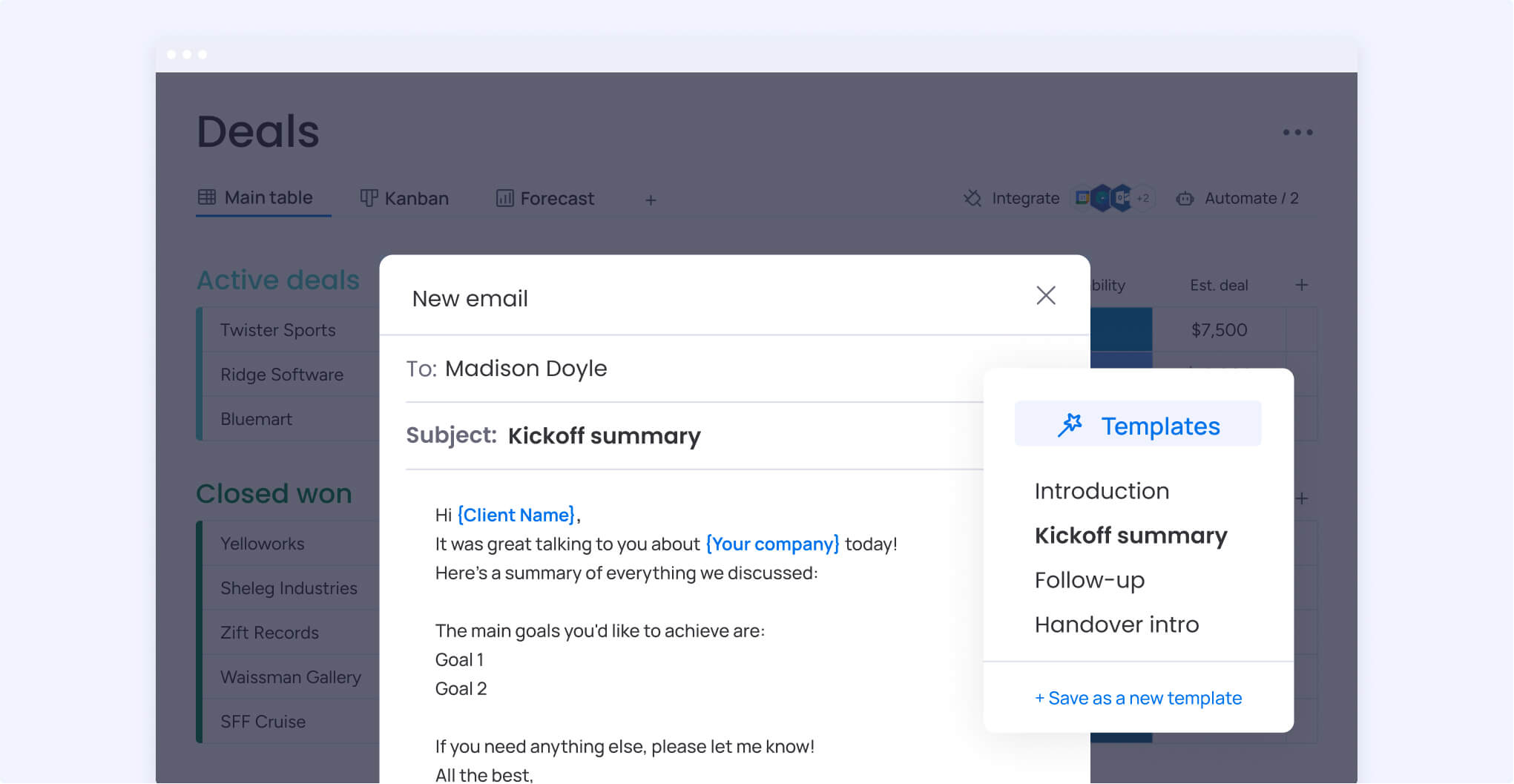
monday CRM offers an intuitive drag-and-drop interface, making it easy to set up email workflows, track campaigns, and manage customer interactions in a cloud-based workspace for real-time collaboration. It integrates email tracking with automation, allowing businesses to streamline follow-ups with email subscribers, nurture leads efficiently, and save time while getting the insights they need.
Key monday CRM features
- AI-powered email writing: Compose context-specific emails with monday CRM’s AI assistant for individual or batch messages
- Code-free email automations: Set up automated workflows to nurture potential customers, send follow-up emails, and personalize customer engagement messaging
- Email marketing integration: With 200+ app integrations for tools like MailChimp, Gmail, and Hootsuite, you can seamlessly sync campaigns across platforms
Pricing
- Pricing starts from $12 per seat/month
- Four plans available: Basic, Standard, Pro, and Enterprise
- Free 14-day trial
- Learn more about monday CRM plans and pricing here
2. Insightly
Best for: Small to mid-sized businesses looking for a CRM with built-in email marketing tools
Insightly combines customer relationship management with marketing tools, making it a great option for businesses that need both functionalities in one platform. Among the typical CRM features, such as a cloud-based platform, customer service tools, and email templates, it also provides a platform to integrate email marketing.
Key Insightly features
- Email management: Get complete visibility into every customer email interaction and manage every detail of communications
- Email automation: Automate follow-up emails and workflows to engage prospects at the right time
- Email client integration: Sync emails directly with apps like Outlook and Gmail and sync data from third-party platforms like Mailchimp
Pricing
- Pricing starts from $29 per user/month
- Three plans available: Plus, Professional, and Enterprise
- Free 14-day trial
- Learn more about Insightly’s plans and pricing here
3. Pipedrive
Best for: Teams that want a CRM with built-in email tracking and pipeline management features
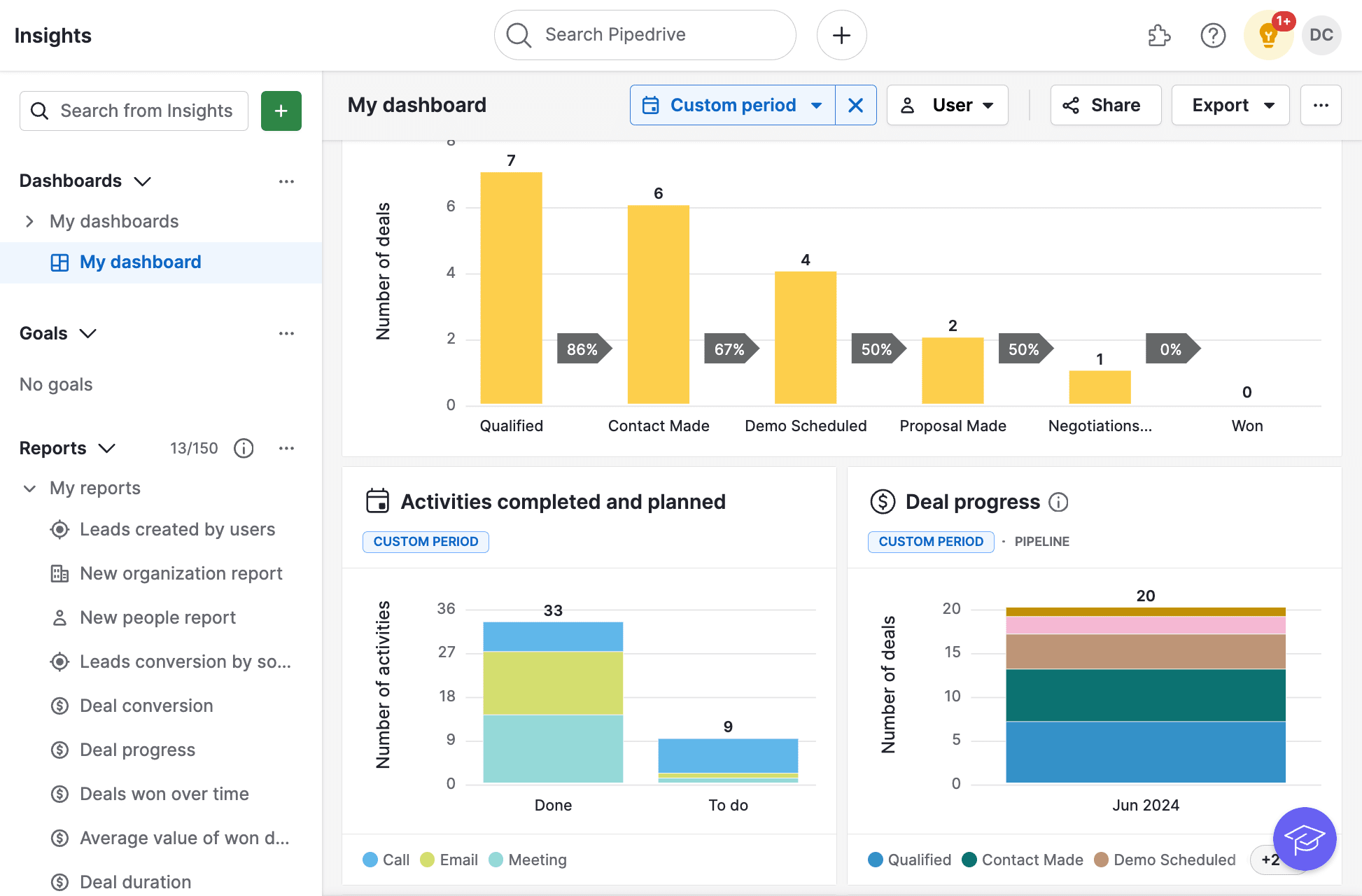
Pipedrive is a sales-driven CRM that helps teams manage deals, track communications, and automate follow-ups. It offers built-in email marketing tools with Campaigns by Pipedrive, including an email builder, analytics, and segmentation features.
Key Pipedrive features
- Email builder: Use professional email templates with an easy drag-and-drop interface to make sending emails quicker
- Segmentation: Use data from your CRM to inform email lists and segmentation based on tailored filters like customer preferences, contact information, and more
- Email analytics: Get detailed insights on your marketing campaigns like open rate, click rate, click-through rate, and more
Pricing
- Pricing starts from $14.90 per seat/month
- Four plans available: Essential, Advanced, Professional, and Power
- Free 14-day trial
- Learn more about Pipedrive pricing and plans here
4. Zoho CRM
Best for: Businesses using Zoho products that are looking for an affordable, all-in-one CRM with email marketing features
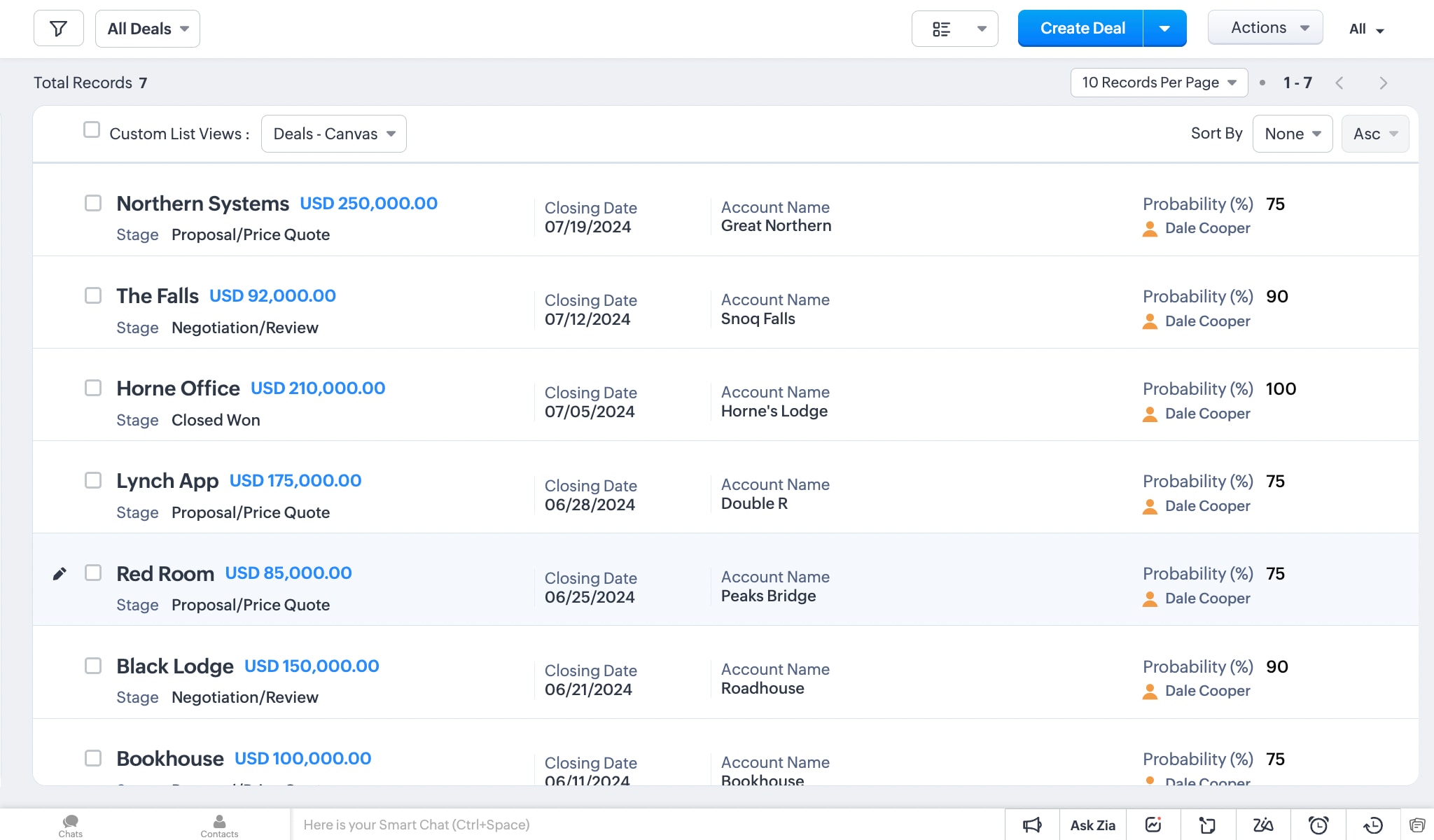
Zoho CRM is an affordable CRM option for small to medium businesses, with a handful of features you’d expect, as well as email marketing tools. Zoho CRM’s cloud-based platform facilitates real-time collaboration, while automation features make it simple to handle large email volumes.
Key Zoho CRM features
- Integrations: Zoho CRM integrates with plenty of email tools, including Gmail, Yahoo!, and Outlook
- AI-powered email insights: Use Zoho’s AI assistant, Zia, to get analytics and insights that improve email campaigns
- Email parser: Automate data entry by extracting important data from incoming emails, such as lead names, company names, addresses, and more
Pricing
- Pricing starts from $14 per user/month
- Four plans available: Standard, Professional, Enterprise, and Ultimate
- Free 15-day trial
- Learn more about Zoho CRM plans and pricing here
5. HubSpot CRM
Best for: Businesses looking for a free CRM with email marketing and automation features
HubSpot CRM is known for its user-friendly interface and powerful email marketing capabilities. The CRM offers automation, personalization, and tracking features, making it a great option for small businesses, but bigger teams will find the free features limiting.
Key HubSpot CRM features
- Email template builder: Send personalized emails from custom-made templates that you can use with integrations with apps like Outlook, Office 365, and Gmail
- AI email writer: Save time writing with AI to generate sales outreach and marketing emails based on data for specific segments
- Email tracking: Track emails by getting notified when messages are open, get an overview of interactions, and pick the best time to send a follow-up
Pricing
- Free forever plan with limited features
- Paid plans start from $15/month
- Multiple plans available depending on the size of your team
- Learn more about HubSpot plans and pricing here
6. ActiveCampaign
Best for: Businesses that need advanced email automation and personalization features
ActiveCampaign is a marketing automation powerhouse with advanced email workflows, segmentation, and AI-driven optimization. It’s ideal for businesses looking to maximize engagement through targeted email campaigns.
Key ActiveCampaign features
- Advanced email automation: Set up multi-step email workflows triggered by customer behavior
- Dynamic content: Send personalized emails based on user actions and preferences to make each interaction a tailored experience
- AI-led email tools: Use AI to generate email content, build email flow automations, and send your emails at the best time with predictive sending
Pricing
- Pricing starts from $15/month
- Four plans available: Starter, Plus, Pro, and Enterprise
- Free trial available
7. Brevo (formerly Sendinblue)
Best for: Smaller businesses looking for an email marketing solution with additional CRM features
While Brevo is more of an email marketing platform, it also includes CRM features and tools for SMS campaigns. Brevo is a great choice for small to mid-sized businesses that want a simple yet powerful tool for managing customer relationships while focusing more on email management.
Key Brevo features
- AI for emails: Let AI generate email subject lines and email content to speed up your messaging process and use predictive sending to send emails at the best time
- Detailed analytics: Track various metrics for each and every email to see what messaging is performing the best
- Advanced segmentation: Create dynamic email lists that automatically get updated based on subscriber activity, such as purchase history or other data
Pricing
- Free forever plan with limited features
- Paid plan pricing starts from $8/month
- Four plans available: Free, Starter, Business, and Enterprise
8. BenchmarkONE
Best for: Small businesses looking for simplicity and ease of use in email marketing
BenchmarkONE is an intuitive email marketing platform with built-in CRM features, making it a great choice for businesses that need a straightforward solution for basic customer engagement. It offers great free plans with automation tools and detailed analytics to optimize email performance, but larger companies may find the free options limiting.
Key BenchmarkONE features
- Sharp email templates: Easily create professional-looking B2B emails without coding with ready-to-go email designs
- Email metric tracking: Get insights into who is opening emails, clicking links, and get reports to help inform future email marketing campaigns
- HTML editor: Use templates you’ve built or from another system with the source code editor for deeper customization
Pricing
- Free Lite and Pro plans with limited features
- Agencies plan requires a custom quote
- Three plans available: Lite, Pro, and Agencies
How can small businesses benefit from a CRM with email marketing tools?
Email still remains one of the most effective marketing methods, with 44% of marketing professionals saying it gets more results than social media or paid search. Email marketing isn’t only for big enterprises, but small businesses can benefit as well.
By using a CRM with email marketing tools, small companies can keep better track of their customers and get insights into what’s working so that they can better scale their operations, grow their business, and get more clients. However, sometimes onboarding new software in a small team can be challenging or unaffordable, in which case it’s ideal to start with either a free CRM or a platform like monday CRM that offers flexible pricing based on the number of users you need.
Try monday CRMmonday CRM: An industry-leading CRM with advanced email marketing features
monday CRM is well-loved by thousands of users across various industries, from small businesses to large enterprises, thanks to its intuitive platform and customization options. When it comes to email marketing, monday CRM shines with its AI-powered automations that make it simple to engage leads and clients, along with its powerful integration capabilities so that you can continue working with the tools you love.
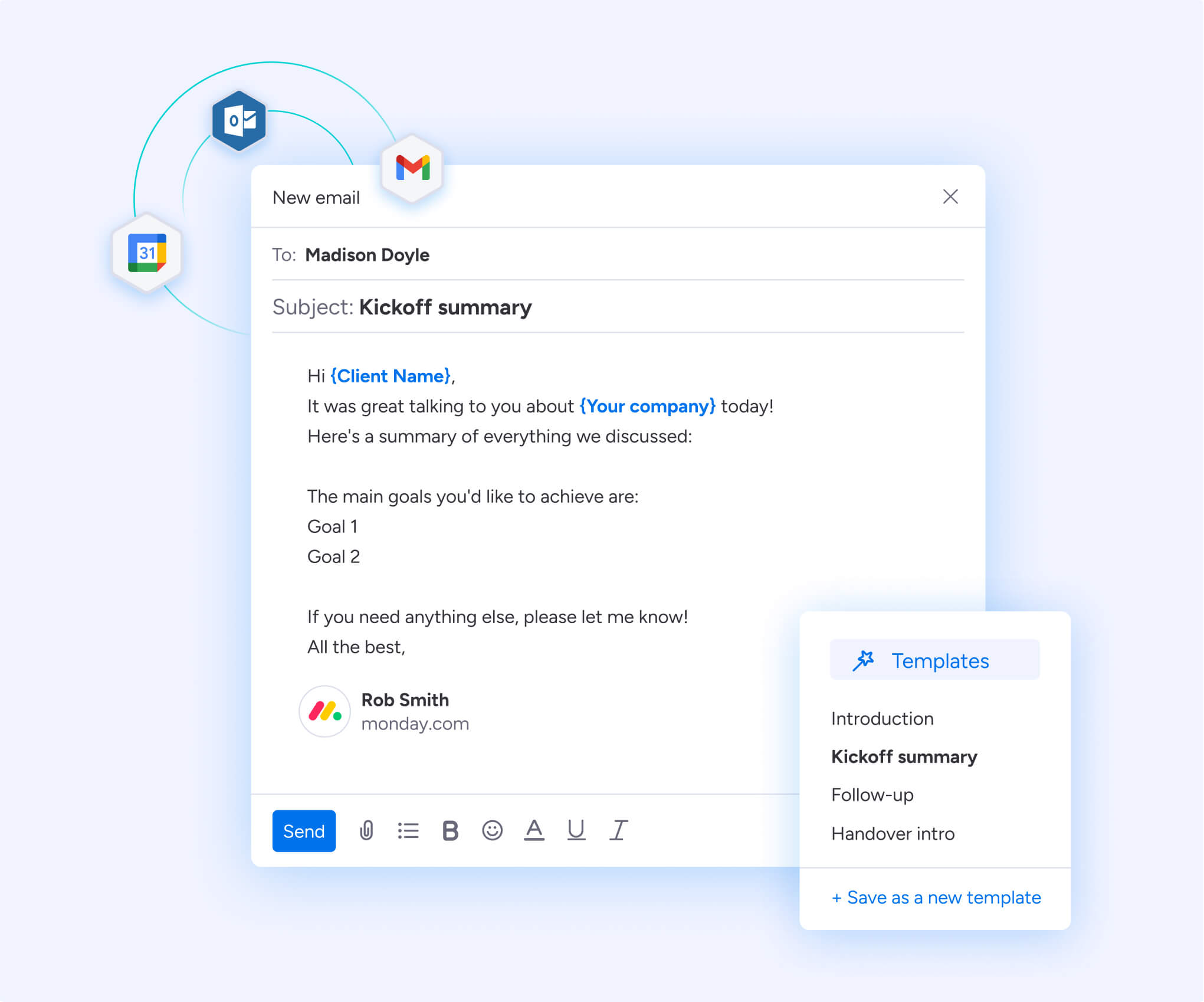
Aside from the features we covered above, monday CRM is packed with other functionalities that make it both a robust CRM and a powerful email marketing solution. Here’s a brief look at some additional monday CRM features you’ll love:
- Get deeper insights into leads and contacts with sentiment analysis for email content
- Choose from hundreds of templates for your boards to organize contacts and messages the way you want
- Send campaigns using bulk emails and tracking features for mass messaging
- Easily create custom email templates that you can use again and again
- Create personalized email sequences based on your segments
- Stay informed and send emails on the go with mobile CRM access
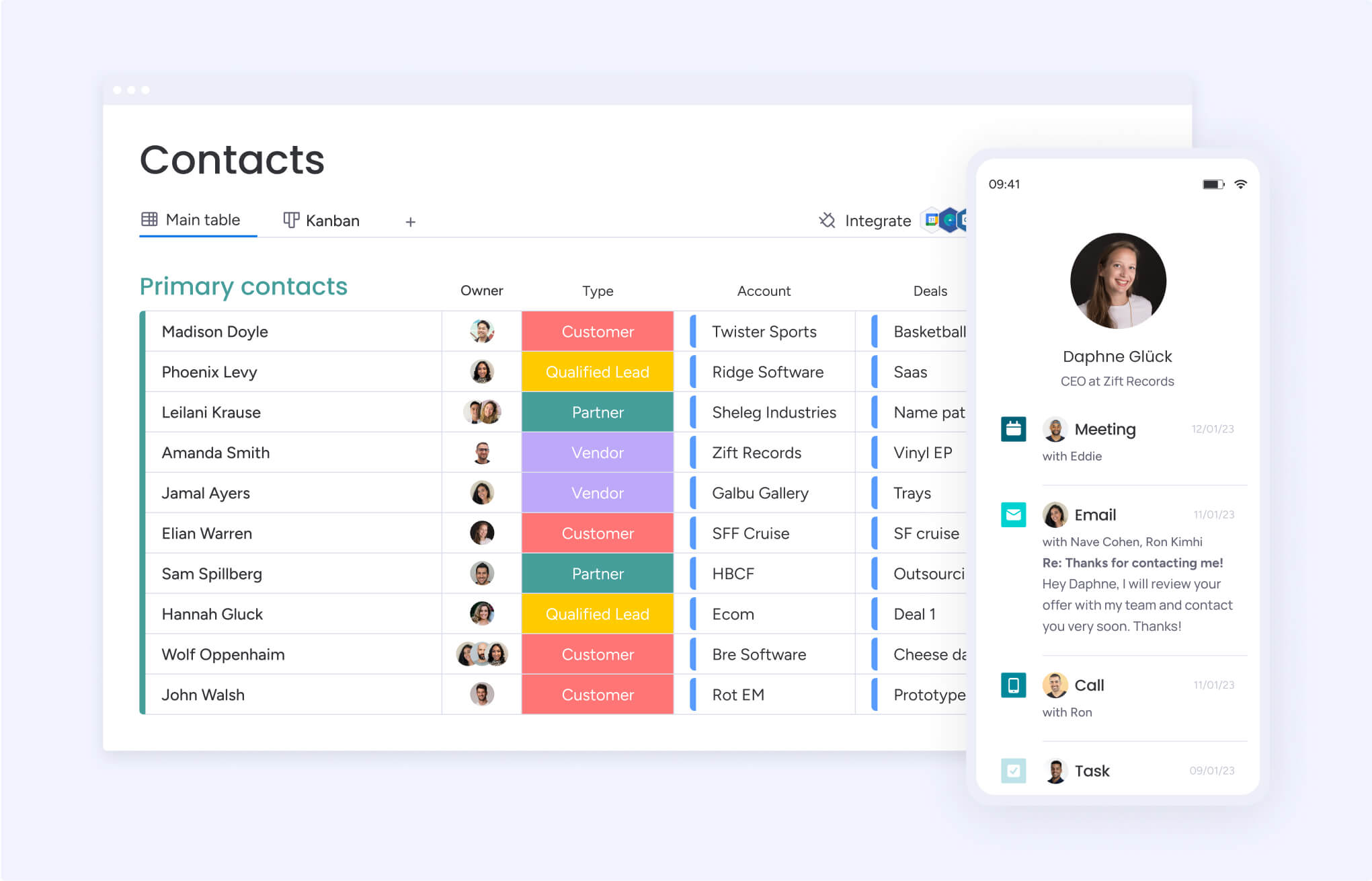
- Advanced analytics and reports show you who opened and engaged with your emails
- Track sales performance with customizable dashboards
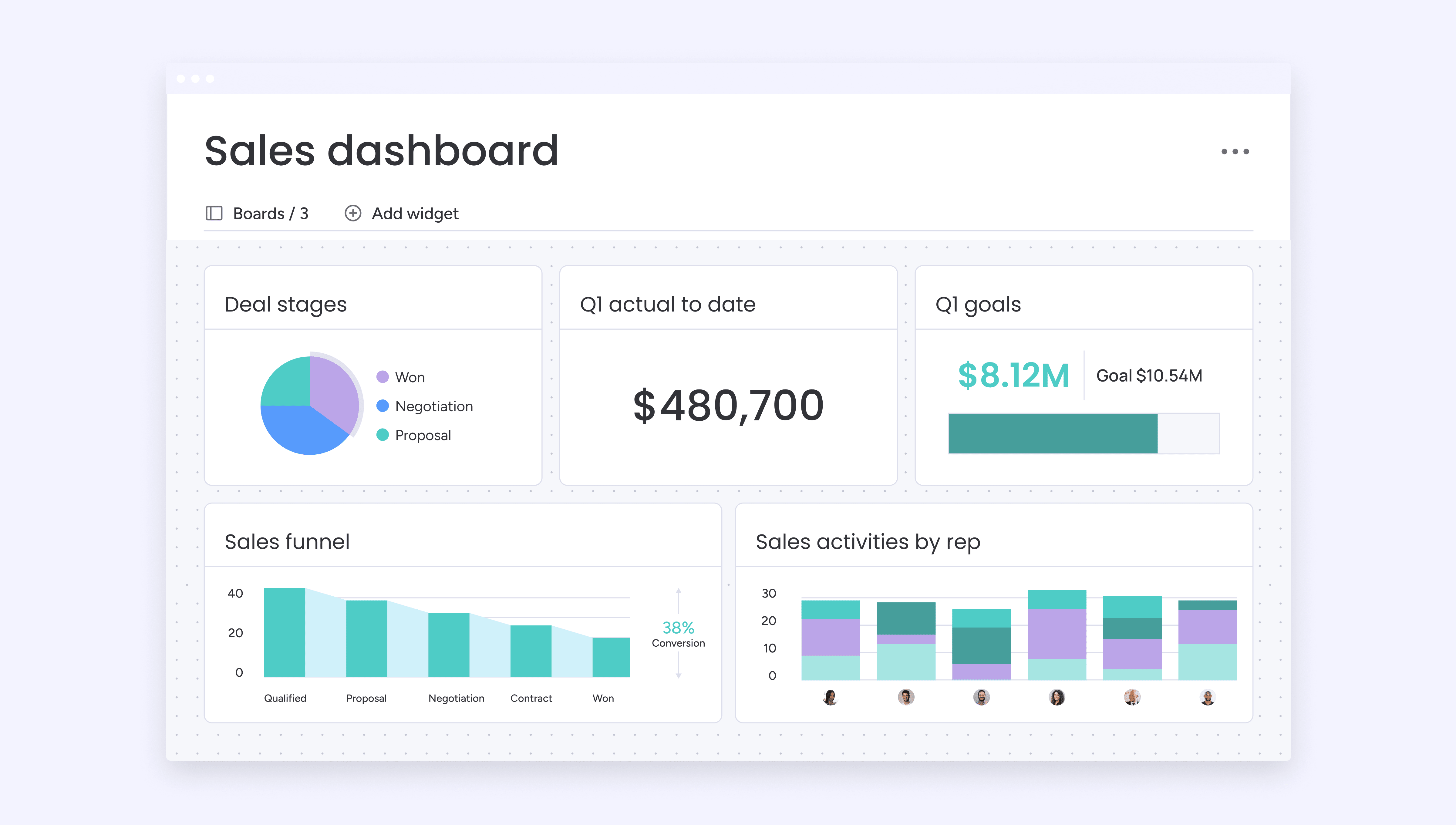
- Use HTML editing to make your emails even more customizable
- Capture leads with custom forms and sync the data directly to your CRM
Trends and predictions shaping the future of CRM email marketing
Emerging trends are shaping the future of email marketing in 2025 and beyond. As email still remains one of the most effective forms of marketing, email marketers are looking to refine processes using new technologies rather than reinvent the wheel. With a CRM, marketing professionals can make sure they’re collecting the data they truly need to implement meaningful change. Here’s a look at some of the trends we can expect to see in CRM email marketing:
AI-powered personalization
AI is being used to create personalized email campaigns down to the small details, including purchase history and user preferences. With a CRM, email marketers can collect unique data points on every customer while AI applies it to email campaigns.
More targeted segmentation
Marketers will be segmenting their customers based on much more specific data points. Rather than focusing on factors like gender, demographics, or location, email marketers will start to segment by browsing behavior, previous purchases, and personal preferences.
Advanced email automations
Marketers are already automating a lot of the email-sending process, but as automation and AI become stronger, they’re going to use it for more targeted actions, like sending emails with better timing. This means sending marketing emails, reminders, and follow-ups at the best time based on AI insights.
Interactive email content
We’ll start to see fewer static messages and more interactive emails where users can interact with elements directly in an email. Live videos, carousels, mini-games, surveys, and polls will be included in the body of an email to make them more engaging.
Greater data security and privacy
Email security is already a top concern for most businesses, but we can expect to see more transparency in how marketers collect and store personal data and subscribers will have more control over their email preferences. With a reliable CRM, marketers can always make sure client data is stored and managed securely.
Streamline your CRM and email marketing in one platform
Managing contacts and engaging them by email go hand-in-hand, so make sure the CRM you’re using has advanced email marketing features to make communication a breeze. With a platform like monday CRM, you don’t have to choose between robust CRM functionalities and customizable email management; you can have the best of both worlds. Whether with the built-in email marketing features or through seamless integrations, monday CRM offers users the opportunity to make it easier to sync data for a successful email marketing campaign.
FAQs
Which CRM is best for email marketing?
Depending on your business goals, there are several email marketing services that can work well to create effective campaigns. For CRM-driven email campaigns, monday CRM is a great option that helps you build strong customer relationships while continuously engaging them with automated email messages.
What is email marketing integration?
Email marketing integration connects a CRM with an email marketing tool, allowing businesses to manage contacts, track interactions, and automate campaigns directly within the CRM. This ensures seamless communication and personalized outreach.
What is CRM marketing automation?
CRM marketing automation refers to using a CRM system to automate repetitive marketing tasks like sending emails, segmenting contacts, and nurturing leads. It helps businesses improve efficiency and engage customers at the right time with personalized messaging.
Can CRM send automated emails?
Yes, most CRMs offer email automation features that allow businesses to send scheduled or trigger-based emails based on customer actions, such as sign-ups, purchases, or inactivity. This helps streamline follow-ups and improve engagement.

